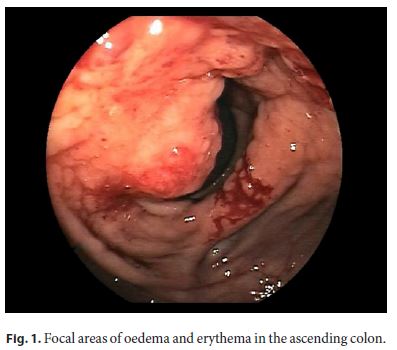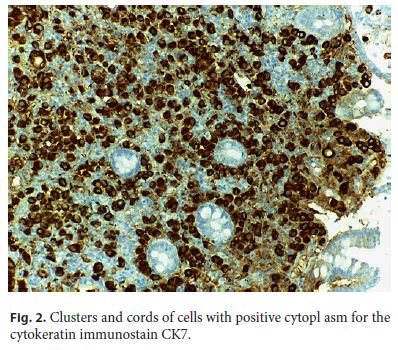Serviços Personalizados
Journal
Artigo
Indicadores
-
 Citado por SciELO
Citado por SciELO -
 Acessos
Acessos
Links relacionados
-
 Similares em
SciELO
Similares em
SciELO
Compartilhar
GE-Portuguese Journal of Gastroenterology
versão impressa ISSN 2341-4545
GE Port J Gastroenterol vol.26 no.6 Lisboa dez. 2019
https://doi.org/10.1159/000497043
CLINICAL CASE STUDY
A Rare Presentation of Breast Cancer
Uma apresentação rara de cancro da mama
Luísa Martins Figueiredo, David Valadas Horta, Jorge A. Reis
Gastroenterology Department, Hospital Professor Doutor Fernando Fonseca, Amadora, Portugal
* Corresponding author.
ABSTRACT
Breast cancer is the most common tumour in women. Only 5–15% of breast cancer patients have distant metastases at diagnosis. Here we describe the case of a previously healthy 43-year-old woman with nausea, postprandial epigastric pain, and constipation as the first clinical presentation of breast cancer. Total colonoscopy revealed colon metastases and the immunohistochemical profile favoured primitive invasive lobular carcinoma of the breast. Gastrointestinal tract metastases are more frequent in lobular histology of breast cancer. Stomach and small intestine are the most common metastatic sites, while colon metastases are a rare occurrence.
Keywords: Colon metastases, Lobular breast cancer
RESUMO
A neoplasia da mama é o tumor mais comum no sexo feminino. Apenas 5 a 15% dos casos apresentam metástases ao diagnóstico. Descrevemos o caso de uma mulher de 43 anos de idade, com apresentação inaugural de cancro da mama manifestada por náuseas, epigastralgia pós prandial e obstipação. A colonoscopia revelou metástases do cólon e o perfil imuno-histoquímico da histologia favoreceu o diagnóstico de neoplasia primitiva da mama, do tipo carcinoma lobular. As metástases do trato gastrointestinal são mais frequentes na histologia lobular de cancro da mama. O estômago e o intestino delgado são os locais mais frequentes de metastização, sendo as metástases do cólon uma ocorrência rara.
Palavras-Chave: Metástases do colon, Cancro da mama lobular
Introduction
Breast cancer is the most common tumour in women [1]. Invasive lobular carcinoma is the second most common histologic type of breast cancer with a prevalence of 5 –15% [1]. Gastrointestinal tract metastases are a rare occurrence [1–3], although more frequent in lobular histology. The underlying reason is unknown but can be related to a particular tropism of the lobular cells [2].
Case Report
The authors report the case of a 43-year-old woman with no relevant previous medical history, with a family history of breast cancer (maternal grandmother and aunts). The patient initially reported a 2-month history of nausea and postprandial epigastric pain associated with constipation and weight loss. Simultaneously, the patient noticed left palpebral ptosis. Upper digestive endoscopy revealed pyloric stenosis and gastric stasis. Total colonoscopy documented focal areas of oedema and erythema in the ascending colon, hepatic and splenic flexures and transverse colon (Fig. 1). Some areas were hard to the touch of the biopsy forceps. Biopsies revealed colon infiltration by diffuse pattern carcinoma, with the morphological pattern and immunohistochemical profile favouring invasive lobular carcinoma of the breast (Fig. 2). When questioned, the patient reported breast lumps that had been increasing in volume and stiffness. The patient’s previous breast ultrasound had been performed 3 months before, with no signs suggesting malignancy.


In further investigation, contrast-enhanced thoraco-abdominopelvic computed tomography (CT) showed densification of the left axillary region with several ganglia with rounded morphology, parietal thickening in the gastric antrum, diffuse parietal thickening of the colon, more significant in the transverse colon, and a small amount of ascites. CT and magnetic resonance imaging (MRI) of the skull and orbit revealed a pseudo-tumour of the left orbit. Biopsy of the left orbital tumour was done, and it showed metastatic lobular carcinoma of the breast. Mammography and breast MRI complemented with biopsies confirmed invasive lobular carcinoma of the breast. Oestrogen receptors were positive in about 100% of the neoplastic cells and progesterone receptors were negative. There were no images suggestive of osteoblastic bone metastases in bone scintigraphy and laboratory workup showed CA 15.3 of 49.47 kU/L and CEA 17 ng/mL, with no other changes.
The patient was referred to the Oncology Department and initiated chemotherapy and radiotherapy to the orbit.
Discussion/Conclusion
Infiltrating lobular carcinoma (ILC) and infiltrating ductal carcinoma are the two most common histologic types of invasive breast cancer, occurring in less than one tenth of patients and three fourths of patients, respectively. ILC is more than a histologic variant of breast cancer; it has distinct prognostic and biologic implications [4]. ILC is three times more likely to metastasize to the gastrointestinal tract, the peritoneum and ovaries, while lung, pleura and liver involvement is more frequently observed with infiltrating ductal carcinomas [1, 2, 5].
The stomach and small intestine are the most common metastatic sites on the gastrointestinal tract of lobular carcinoma, whereas colon metastases are very rare [2, 6]. In fact, metastatic neoplasms in the colon are an uncommon entity, emerging in approximately 1% of total colorectal cancers. Secondary involvement of the colorectum is usually deriving from the lung, ovary, breast, prostate, kidney, skin, stomach, or hepatobiliary system [7]. Colorectal metastases of ILC of the breast are a diagnostic challenge since they can simulate primary colon cancer. Endoscopic features of ILC metastasis to the gastrointestinal tract include mucosal nodularity and rigidity and thickening of intestinal wall, as well as lobulation and deformity caused by the presence of a mass [8].
The median interval between the diagnosis and the development of gastrointestinal metastasis was reported to be 6 years [3]. Only 5–15% of breast cancer patients have distant metastases at diagnosis [6].
Given all the aspects mentioned, the authors consider that this is an extremely rare case.
References
1 Molina-Barea R, Rios-Peregrina RM, Slim M, Calandre EP, Hernández-García MD, Jimenez-Rios JA. Lobular breast cancer metastasis to the colon, the appendix and the gallbladder. Breast Care (Basel). 2014 Dec;9(6):428–30. [ Links ]
2 Ambroggi M, Stroppa EM, Mordenti P, Biasini C, Zangrandi A, Michieletti E, et al. Metastatic breast cancer to the gastrointestinal tract: report of five cases and review of the literature. Int J Breast Cancer. 2012;2012:439023. [ Links ]
3 Wadah A, Zakir KM, Thekkinkattil D. Colonic metastasis from a breast carcinoma, an unusual colonoscopic finding. BJMP. 2016;9(1):a901. [ Links ]
4 Pestalozzi BC, Zahrieh D, Mallon E, et al. Distinct clinical and prognostic features of infiltrating lobular carcinoma of the breast: combined results of 15 International Breast Cancer Study Group Clinical Trials. J Clin Oncol. 2008 Jun 20;26(18):3006–14. [ Links ]
5 Arpino G, Bardou V, Clark G, Elledge RM. Infiltrating lobular carcinoma of the breast: tumor characteristics and clinical outcome. Breast Cancer Res. 2004;6(3):R149–56. [ Links ]
6 Uygun K, Kocak Z, Altaner S et al. Colonic Metastasis from carcinoma of the breast that mimicks a primary intestinal cancer. Yonsei Med J. 2006 Aug 31;47(4):578–82. [ Links ]
7 Galanopoulos M, Gkeros F, Liatsos C, et al. Secondary metastatic lesions to colon and rectum. Ann Gastroenterol. 2018 May-Jun;31(3):282–7. [ Links ]
8 Gonzáleza RA, Gimeno-Beltrána J, Vázquezde las Heras I, et al. Lobular breast carcinoma with colonic metastases: a synchronous diagnosis in a 4-day period. Human Pathol (N Y). 2017(7):27–30. [ Links ]
Statement of Ethics
The authors have no ethical conflicts to disclose.
Disclosure Statement
The authors have no conflicts of interest to declare.
Funding Sources
The authors did not receive any funding.
* Corresponding author.
Luísa Martins Figueiredo
Gastroenterology Department
Hospital Professor Doutor Fernando Fonseca, IC19
PT–2720-276 Amadora (Portugal)
E-Mail luisa_mmfigueiredo@hotmail.com
Received: October 28, 2018; Accepted after revision: January 12, 2019
Author Contributions
All listed authors participated meaningfully in the study, as follows: Luísa Martins Figueiredo drafted the article, David Valadas Horta and Jorge A. Reis critically revised the article, and all authors approved the final version for publication. All authors agreed to be accountable for all aspects of the work in ensuring that questions related to the accuracy or integrity of any part of the work are appropriately investigated and resolved.














